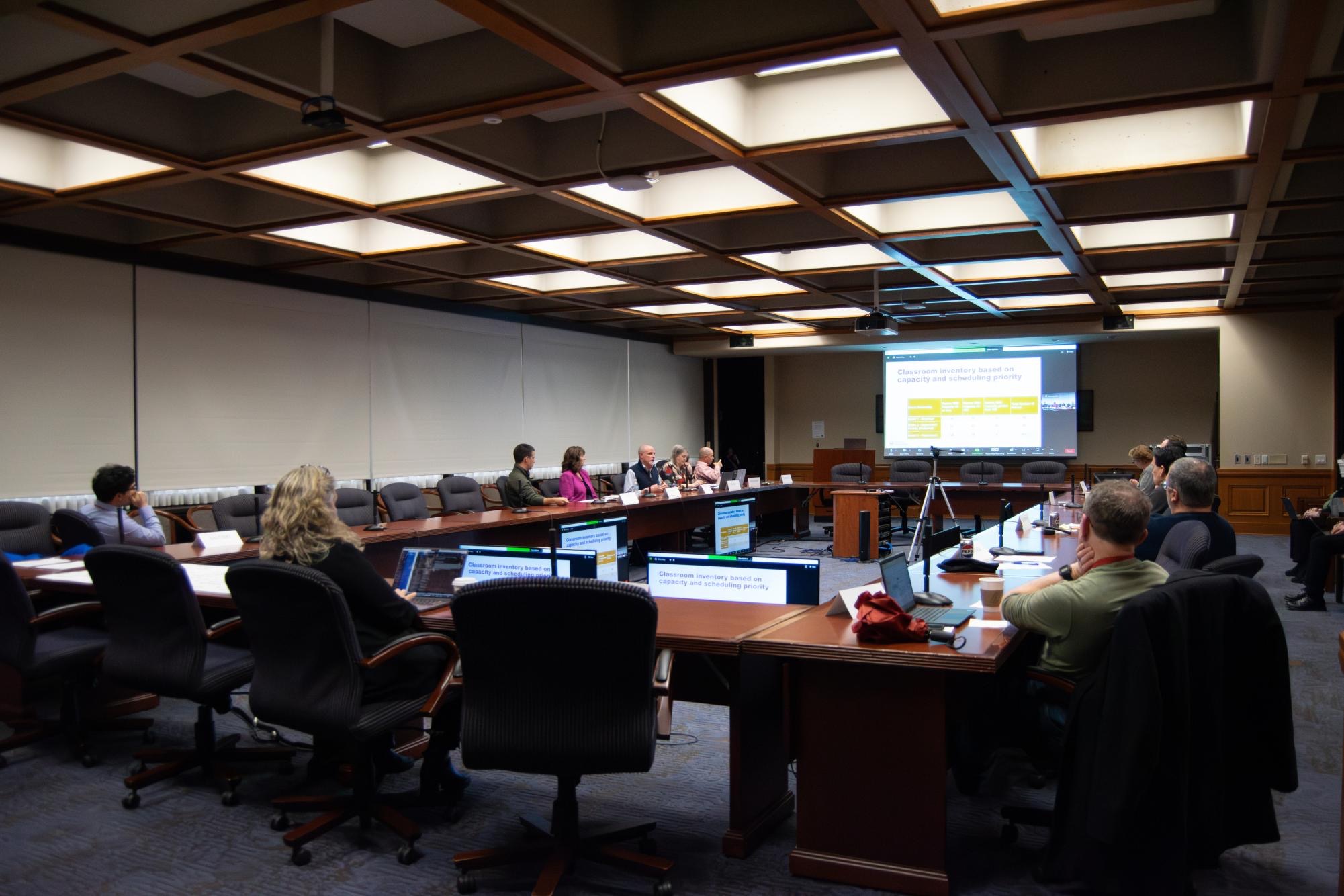Faculty assembly discusses student safety in the wake of antisemitic attacks on Pitt students


Faculty Assembly meets in Posvar Hall on Wednesday afternoon.
Faculty Assembly President Robin Kear addressed the recent antisemitic attacks on Jewish students at Pitt at October’s Faculty Assembly meeting, saying they made her “greatly concerned.”
“I have heard urgent calls for the security of our Jewish students during the month of October,” Kear said. “I want to acknowledge this and say that we are working constructively to address concerns that are brought to the Senate.”
Two public safety officials spoke about the recent antisemitic attacks on Jewish Pitt students and highlighted safety services at the monthly Faculty Assembly meeting on Wednesday afternoon.
Ted Fritz, vice chancellor for public safety and emergency management, said the Office of Public Safety is “here to protect the faculty, the staff and the students.”
“That’s our core mission regardless of their beliefs, their affiliations, their views,” Fritz said. “We have to protect the safety of an entire community.”
Fritz said he has spoken with Student Government Board and other student groups about on-campus safety tools and promoted multiple safety resources, including the For Safety’s Sake Brochure, Pitt Police social media accounts and the revamped safety website, which contains a wide array of videos on topics like how to stay safe, active shooter programs, evacuations and lockdown procedures.
Fritz spoke about the importance of the “rapid deployment” of technology around campus with the implementation of 1000 panic buttons, 1600 cameras and over 64000 card readers on buildings.
Holly Lamb, chief of Pitt police, spoke about Pitt police’s diligence in communicating with multiple groups on and around campus regarding safety.
“We talk to everybody, whether it’s student groups, local police departments or our partners at CMU and Carlow,” Lamb said. “Our relationships have grown so much because of that communication.”
Lamb explained many of the courses and resources available to Pitt community members, including a free two-hour self-defense class and the Citizen Police Academy, which will be starting back up in January. Lamb promoted the Walking Escort Program for students, faculty and staff, which has added services in the William Pitt Union.
When the meeting opened for questions from faculty and staff, multiple people expressed their concern for the well-being of Jewish students on campus.
“Students have found these incidents to be distressing,” Christopher Bonneau, professor of political science at Pitt, said. “The temperature is very high both in the country and campuses in particular, and I think there have been plenty of incidents to give rise to these kinds of feelings.”
Jennifer Murtazashvili, professor at the Graduate School of Public and International Affairs, also spoke about how the antisemitic attacks are affecting Jewish students’ mental health.
“[The attacks] have led to an environment on campus where so many of the Jewish students who I have spoken to are hiding their identity,” Murtazashvili said. “Students are feeling excluded, they are feeling alone, they are feeling isolated.”
Following faculty and staff comment, Provost and Senior Vice Chancellor Joseph McCarthy spoke about the Authorization for Release of Records and Information Form, which is signed by new hires and allows previous employers to release records to the hiring committee so they can assess any potential threats to the Pitt community.
McCarthy said concerns were raised by the Pitt community about how the form was implemented, saying it was introduced in “sort of a rapid fashion.”
“We found a little bit of unevenness as to where those release forms were stored, how the release authority that was given to the University was operationalized and ultimately, if records were ever obtained, where they were [and] what the impacts of those records were,” McCarthy said.
President Kear added to McCarthy’s statement by saying concerns also stemmed from the ethical perspective of informal allegations, saying the form “wasn’t always clear on if something could be an informal substantiated allegation and what that means and how that would be presented from another place of employment to Pitt.”
McCarthy added that he and Kear planned on drafting an interim policy to “authorize the practice that has been going on.”
“I, in consultation with President Kear, talked about what’s the proper path forward to achieve those same goals in a way that’s a bit more collaborative with the University community,” McCarthy said. “Because this is such a critical issue, we don’t want to stop using the current form completely.”
Recent Posts
A Good Hill to Die On // The motivation we all need
In this post of “A Good Hill to Die On,” staff writer Sierra O’Neil discusses…
Who Asked? // Is it really the damn phones?
This installment of Who Asked? by staff writer Brynn Murawski describes her brief journey limiting…
Students are ‘upset, but not surprised’ over denial of gender affirming care at UPMC CHP
Pitt students and LGBTQIA+ members express their concerns about the recent denial of gender affirming…
Take Madness Final Four | Battle of Pennsylvania, 412 and Just Outside of Philly clash
Welcome to the Final Four of Take Madness! We are down to four talented writers,…
Column | Best Sports Environments in Pittsburgh
Pittsburgh is undoubtedly one of the best sports cities in America. A deeply passionate fanbase…
Chalk is all the talk: Previewing the NCAA men’s Final Four
For the first time since 2008, all four first seeds have made the men’s Final…

